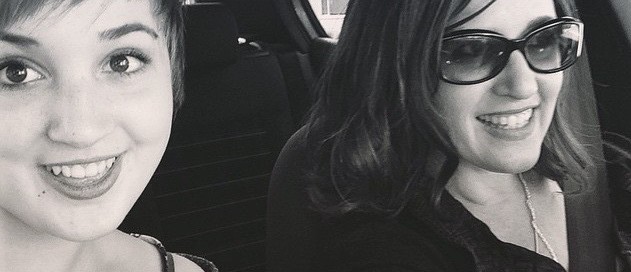
Lately things have been going amazingly well for Cait. She just passed her 13 month seizure free milestone (with no meds or modified diet – insert happy dance). My husband has taken to saying she’s in remission from her Epilepsy. But while we are flying high over here in the Shaw household, I’m keenly aware that some of our friends who are struggling with Epilepsy are not nearly so fortunate.
In particular, two moms with younger boys who have the disorder (one a young teen and the other an elementary school student) have been posting messages that ooze with despair. Another mom posted of her baby daughter’s death due to Dravet’s Syndrome. Through their pain I see a reflection of what we’ve also experienced living with this disorder.
Epilepsy does not affect just one person in the family. It affects all of us and I think as a mom it often hits hardest. Especially when there is a genetic component to the disease (in our case from my side of the family). Even though you know it’s not your fault, the decisions you have to make while parenting a child with Epilepsy too often come down to choosing the lesser of two evils.
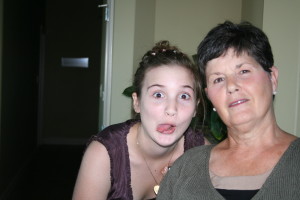
Both Cait and my mum have Epilepsy. Having a grandmother who has led a full life (including successful marriage, family and career) has been very inspiring for Cait.
Cait is currently doing so well that it would be easy for us to forget about all the struggles we’ve dealt with over the last 15 years. I’ll be honest, there is a large part of me that wants to forget those struggles and focus on the beautiful, creative young woman I see emerging from the dust Epilepsy left in its wake. But that would be both naïve and unfair to others who are struggling right now. Cait has reminded me over and over again that we have the responsibility of sharing our experiences with others to help them through the hard times.
Something you will never understand unless you parent a child with this disorder is that decisions you have to make are never easy. Medicating your child with anticonvulsant drugs is one of the most difficult and, at the same time, one of the easiest decisions you will ever make. For Cait we resisted medication as long as we could. My husband and I both did a significant amount of research about the side effects of the medications that are used to control Epilepsy and found, without exception, that they are horrendous. They are all drugs that affect your brain function in some degree (after all Epilepsy is a neurological disorder). So we resisted medicating our 6-year old for nine months. Her seizures were sporadic and, we believed, tolerable. In short, we were in denial.
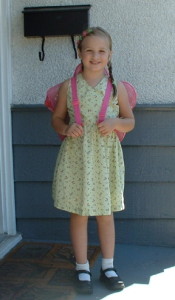
Very excited to finally start Kindergarten. Little did we know that by the end of this year she would be diagnosed with Epilepsy
Then December 1st, 2004 arrived and Cait began seizing over and over. After several hours it became clear to me that her brain had slipped into a horrific pattern. She was having a grand mal seizure every 30 minutes. Thankfully she didn’t go into status epilepticus (when you have a seizure that lasts for more than 30 minutes) but by the time she’d had her 10th seizure of that day, she was exhausted. And it was obvious that they were not going to stop on their own. We agreed readily to the medications her neurologist ordered. At the end of that ordeal, she’d had 14 seizures within 12 hours and I remember sitting in her hospital room finally beginning to understand how serious Epilepsy could be.
Still as a parent you never lose hope. And since Cait was so young, we hoped that after several years on medication she would outgrow her disorder, as many children do. And for a time we thought she had, indeed, outgrown her seizures. It wasn’t until her last year of elementary school that she started having seizures again. And this time they were nocturnal. A new horror and fear entered our lives.

Always full of joy despite the struggles of middle school.
Nocturnal seizures can lead to SUDEP (Sudden Unexpected Death in Epilepsy). For Cait these new kinds of seizures were terrifying. Soon sleep anxiety and insomnia took over her life. After three months, she was back on anticonvulsant medications. We were so relieved when the drugs stopped her seizures almost immediately, that it took us longer to notice the side effects.
It was just before the start of Grade 6, the transition to Middle School here, that Cait was newly medicated. It would take us and her teacher six months to understand just how significantly the medication would affect her life. Always a straight A-student, we had chosen to put Cait in the Late French Immersion stream at her school, hoping it would keep her from becoming bored with her studies. If I could go back now, that is one decision I would erase.
Her seizures and new medication affected Cait in two distinct ways (and a lot of other small ones as well).
The first was speech problems. Our early and voracious talker (my brother once asked me how old Cait was when she started speaking and I said I thought she born talking) soon became almost silent at school. Topamax (the drug she was on) is notorious for causing problems recalling words. She would either not be able to articulate a word or she would use the wrong word. You can imagine how difficult this was when she was suddenly taking her classes in a different language (French). She couldn’t remember her English words never mind the new ones.
The second was a lovely spectrum of confusion, slowed thinking, memory problems, trouble concentrating and the inability to stay organized. Cait remembers to this day when her exacerbated teacher borrowed the notes from the top student in her class and photocopied them because she said Cait “was the most disorganized student she had ever seen.” We didn’t realize it was the meds causing the problems at the time. For my conscious child, it was mortifying.

A quiet moment at the market stall she started. The biggest struggle was making her brain cooperate enough to give customers the correct change.
But her seizures stopped while on the medication with a few minor increases needed to halt any break through episodes. So Cait stayed on the medication for four and a half years. Her grades plummeted. Her social life dwindled. But she was seizure free. The drugs were working.
It was Cait herself who asked to go off the medication. Her first year of high school was filled with a multitude of ups and downs. Some were good: she started dating for the first time and the boy didn’t run for the hills when she told him about her Epilepsy; her school principal had personal experience with Epilepsy as a teen and talked to her about it. But most of those experiences were not good. Her memory problems became worse and she started to have horrific migraines. Her weight plummeted to the point where her neurologist was worried she was becoming anorexic. She seemed to catch every virus that even entered the school. She was reluctant to talk to any of her peers about her Epilepsy for fear of being judged. Her grades dropped and for the first time in her life she failed a course: Math 9. Coming from a family of academics (3 PhDs and 2 lawyers) and being an academically motivated student, the F on her transcript was the final straw for Cait. She was so humiliated by it that she demanded to go off her meds.
That was the start of what she describes as the worse year of her life. While still in the hospital she started advocating online for Epilepsy and when she came home she kept going with her advocacy work. A lot of people know Cait for that because that’s how they met her or how she became defined in our small community. When she won a national Me to We Award for her advocacy work, I don’t think many people knew that she had just gone through a horrific 12 months in her personal life.
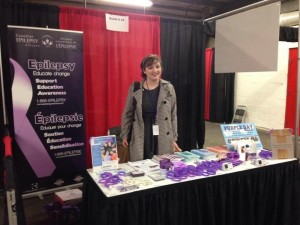
Volunteering at the Centre for Epilepsy’s info booth at Teenfest Canada one week after being discharged from the hospital in Kelowna and the day after testing at Children’s Hospital in Vancouver.
Always a determined child, Cait was set on getting off the meds that were “ruining” her life. But going off anticonvulsant medication is never an easy task. Over the next thirteen months, Cait would have more than 100 seizures, try three different meds (one of which affected her moods so much that it made her suicidal) and ultimately go on an extreme diet (the ketogenic diet) that finally stopped her seizures completely but caused stomach pain so intense it landed her back in the hospital with seizures. When Cait wasn’t too sick to get off the sofa and go to school, she was doing her advocacy work. Her social life was non-existent but that was the least of our worries.
Looking back now, I can hardly believe that we let her go through all that. It would have been far easier to keep her on her medication. But Cait has a different perspective. She sees her middle school and early high school years through a fuzzy haze. Her memory loss from that time is truly heartbreaking and something she is just now starting to accept. She says there are huge gaps in her memories. And while the side effects of the Topamax have almost abated there are times when she still struggles to find the right word and her organizational skills are almost non-existent. Sometimes I worry what damage was done by the seizures and meds but most of the time I am just so grateful for the life Cait has today.

Sketching, painting, photography, film, writing and music – her foundation stones.
She is now a senior in high school. Her grades are back in the A-range where she wanted them. While she is still behind in Math (working online to finish her Grade 11 course) and has given up on her dream of becoming a scientist, she has found other pathways that have opened up a world of possibilities for her.
She is a gifted wordsmith. A better writer than I am by far. Her creativity in written, spoken and visual arts stuns me. It is as if all the pain and loss she has experienced come out in her art and her love for others. She sees those in pain more readily than many girls her age do and she is passionate about social justice.
Have we forgotten about her Epilepsy? No. While it does appear to be in remission right now, it will always be a part of who she is. Cait is learning to make choices that don’t jeopardize the life she has now. That means she has to make smart choices even when it hurts to do so.

At the airport as she leaves for her first solo international trip to Ecuador and the Amazon with Me to We. Scared but excited.
Last week her grad class had their traditional bush party, “Sunrise.” Cait knew that she wouldn’t be able to go to it. It was in a remote location with no cell service and she had no one she felt she could go with whom she could ask to be responsible for her. One of her friends once described staying with Cait while she was having a bad day seizure-wise as “babysitting her.” She has never forgotten that and she despises being thought of as a burden to anyone. Since she doesn’t have her full N driver’s license yet, she couldn’t leave if she needed to. And she didn’t want to risk ruining her friends’ party. She said to me, “Can you imagine how horrible it would be for them if I suddenly had a seizure out there?” So we made fun alternate plans for that night and I thought she was okay with it. My heart broke a little when I saw her Twitter post from that night. She had done the right thing but being a responsible teenager is an oxymoron at times.
Watching her make smart decisions is bittersweet. I know that Epilepsy has stolen a bit of her youth from her. Some of my friends have described Cait as an “old soul.” She can’t afford to be a carefree and crazy teen. She’s always thinking of consequences: “If I have a seizure, I’ll lose my driver’s license.” But at the same time I think she has more fun in the simple things that too many of us take for granted. She isn’t scared to be silly and goofy at times. She is one of the most authentically human teenagers I know!
As we move forward, I can say Epilepsy has taught us a lot. But as she passes each seizure-free milestone, Cait also feels a bit of sadness – for those who may never hit those milestones and for herself if her seizures return. She knows that this might not be forever. She’s heard too many stories about Epilepsy returning to take any of this for granted. For now she is living in the moment, which we all need to do more of. She is determined to make her last year of high school her best year. And when I think of next year when she will leave home for university, I push the apprehension and worry aside and instead force myself to focus on the excitement for her.
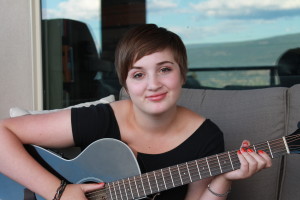
To all my friends who are struggling with this horrible disorder, I can’t say it will get better because we all know that sometimes it just does not. But I will say this. If we stop and try to live in this moment, with our children, whether that moment includes seizures or not, then we can embrace the gift that is parenting. When your heart aches for your child, try to focus on the positive. For me that was easy because I had Cait guiding me. Life is just life. Life is not Epilepsy. In her own words, “I have epilepsy but I’m not an epileptic, I refuse to be defined by my disorder.”

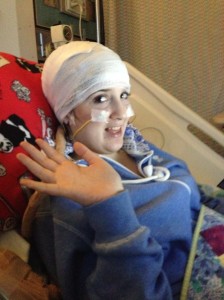






donna and dad
Oh my thanks for sharing!
Speechless!
Love you!
Marlene Petro
Thank you for this inspiring message. I am the mother of a 15-year-old son who has a rare and severe form of Absence seizures. People sometimes think that since one does not fall down and convulse with Absence seizures, that they have it easy. Not so. My son needs 24/7 supervision. No exceptions…ever. He has been on a multitude of medications, and has a VNS, but still he gets no relief. As of late he has been experiencing 3 to 4 prolonged seizures daily to the point where he needs his rescue meds (in addition to his 50 daily mini seizures). It is sad. So sad. And it is scary. So scary. Even though I don’t know you or Cait, I feel pride for both of you. What an amazing young woman you are raising, and what an amazing mother you are – and that she sees. I tell my son the very thing your daughter has told you – that Epilepsy is something he HAS…not something he IS. Wishing you and Cait the very best…..Marlene & (son) Danny
Jacqueline Sephton
Beautifully written authentic account…our daughter is 16 with epilepsy as well and we are are 7 weeks seizure free. Cait has always been an inspiration to us. Now we know that her mom is amazing too…thanks for sharing.
Dave Loy
Hi Cathy,
What a wonderful piece of writing, it inspired me and broke my heart in equal parts I think.
My name is Dave Loy, I’m 35 and have had epilepsy almost ten years now. Apparently it was because of a weird birth thing but no idea why it came up so generally late in life.
I got connected with Cait through my sister Victoria Loy. She used to live in Canada and I’m not sure if she had a direct or indirect connection with your family. But she connected me to her.
I’m over the moon to hear she is so long seizure free and I hope it continues. I have facebooked Cait a few times and followed her ups and downs since being introduced to her story a few years ago. I have generally low grade stable epilepsy I would call it. I have petit mals every now and then, but haven’t had a grand in about 18 months. My medication of keppra, epilem and vimpat seems to have worked keeping the big ones away. Like Cait I went through a lot of drug combos before that and experienced the hellish side effects you talked about. The mood swings were horrendous.
The worst I ever had was about two big siezures in an afternoon period, so I simply cannot understand the higher frequency Cait has gone through as a developing child having so many more, over and over. It might have been even worse for you and your family to watch her do the same I think. My wife has been so supportive of me and has gone through this terrible ride with me all the way, and I cannot imagine what it’s like for her to be so worried for her loved one.
The physical symptoms and damage of this disease are obvious, but what might not be is the psychological toll. As you say about Cait, I shrunk back from the world, my confidence was shattered, I didn’t want to talk to people in case I had a seizure and they thought I was weird. It’s such a vulnerable feeling and I hated it. I’m happy to say that now I’m better though, like Cait. To hear that Cait is doing well and is clearly working with and through that psychological damage and building confidence back up and chasing dreams is amazing. You must be so incredibly proud of her.
Thank you for writing this insightful piece, you’ve made my day.
Kind Regards
Dave
Renee
Thanks for sharing, so many can’t understand what these kids go through.
Tracey Tackett
You just told my daughters life story word for word. You just told my “as a mom” story word for word, everything you said was if you wrote it for us. Thank you I will share!
Helen
Can I ask, did the seziures stop when on the keto diet or did Cait decide to medicated again or did they just stop one day?
My 6 year old nephew has epilepsy and has been seizure free from the second day of starting the keto diet in 2012. Ive recently become a mum myself and cannot fully comprehened what my sister and her husband have gone through and still go through.
Best wishes for all the family in the future
Cathi Shaw
Cait was seizure free after 2 days on the Keto diet. She is now off the diet and all meds. Which is amazing! (:
Mandi
Thank you for sharing. Sadly, I see my 15 yr old daughter dealing with a lot of what you have said Cait dealt with. Shewas diagnosed about 1.5 yrs ago. The seizures started 2 months after she was in a serious car accident. She has had 10 grand mal seizures total & started having absence seizures about 6 months ago as well. She is on her 3rd medication…at our biggest gap so far with grand malls, but the absence seizures are not getting any better. In a year she has lost over 40lbs, stays to herself most times, grades dropping, short term memory issues, confusion, does not like to talk about her epilepsy, and lives in fear everyday. It breaks my heart!! Thank you for sharing & Congrats Cait on being seizure free…I love reading storieslike these!!
Kim
Oh, my. This story is all to familiar and could have easily be written by me about my own Kait. Thank you for taking the time to so eloquently describe what life with epilepsy is like, so many people just don’t grasp how it truly impacts every little piece of life.
Cait, congratulations on reaching a huge milestone. 13 months seizure free is most definitely worthy of celebrating. If you ever want to connect with someone who lives a parallel life, I’d be more than happy to connect you with my Kait.
Wishing you and your family many more seizure free moments for the future.
Louise
I cried through this entire blog. My daughter is now 24 and has had the last five months seizure-free. This is the longest she has gone since she was diagnosed at age 12. We have lived a similar life for the past twelve years, throwing in four brain surgeries. Thank you for sharing this. Go Cait!
Bjorn Akselsen
Thank you for sharing your inspiring story. So much of what you write echo our experiences, thoughts, worries and the impossible decisions we face. We, too, have been constantly trying to figure out what is worse; epilepsy or the medicine. Like you, we’re adapting, trying things and respond to the unpredictable nature of the disease. Our daughter was seizure free for a long time, then they started again just at the moment when we felt we had gotten our girl back (from the medicine). Now we’re scrambling to respond. It is stories like yours that make us realize we are not alone and that there’s indeed reason to be both hopeful and optimistic! Good luck to you and your family.
Kate
Thank you for sharing. Your story encourages me a lot. My daughter went through a similar highschool life. Now she is in university but her memory and physical condition don’t seem to be strong enough to get through.
Melissa
I’m writing on behalf of my cousin (her email). Her high school age son was just diagnosed
I read your blog and it seems like you may be able to offer some guidance. I will send her an email with a link to this page and hopefully you may be able to offer some mom to mom advice.